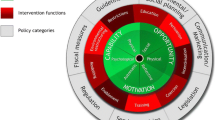Abstract
Introduction There are challenges associated with selecting a qualitative research approach. In a field abundant with terminology and theories, it may be difficult for a pharmacist to know where and how to begin a qualitative research journey. The purpose of this paper is to provide insight into generic qualitative research and to describe the journey of data collection of a novice qualitative researcher in the quest to answer her research question: ‘What are the barriers to accessing medicines and pharmacy services for resettled refugees in Queensland, Australia?’ Methodology Generic qualitative research draws on the strengths of one or more qualitative approaches. The aim is to draw out participants’ ideas about things that are ‘outside themselves’; rather than focussing on their inner feelings the research seeks to understand a phenomenon, a process, or the perspectives of participants. Sampling is designed to obtain a broad range of opinions about events and experiences and data collection includes interviews, questionnaires or surveys; thematic analysis is often used to analyse data. When to use Generic qualitative research provides an opportunity to develop research designs that fit researchers’ epistemological stance and discipline, with research choices, including methodology and methods, being informed by the research question. Limitations Generic qualitative research is one of many methodologies that may be used to answer a research question and there is a paucity of literature about how to do it well. There is also debate about its validity as a qualitative methodology.
Similar content being viewed by others
References
Strauss A, Corbin J. Basics of qualitative research: grounded theory procedures and techniques. London: Sage; 1990.
Brown E. Tackling medication non-adherence in severe mental illness: where are we going wrong? J Psychiatr Ment Health Nurs. 2015;22(3):192–8.
Morrison P. Living with antipsychotic medication side-effects: the experience of Australian mental health consumers. Int J Ment Health Nurs. 2015;24(3):253–61.
Sewell K. Perceptions of and barriers to use of generic medications in a rural African American population, Alabama, 2011. Prev Chronic Dis 2012;9.
Kahlke RM. Generic qualitative approaches: pitfalls and benefits of methodological mixology. Int J Qual Methods 2014;37–52.
O’Leary Z. The essential guide to doing your research project. 2nd ed. London: Sage; 2014.
Percy W, Kostere K, Kostere S. Generic qualitative research in psychology. Qual Rep. 2015;20(2):76–85.
Connelly FM, Clandinin DJ. Stories of experience and narrative inquiry. Educ Res. 1990;19(5):2–14.
Merriam SB. Qualitative research and case study applications in education. 2nd ed. San Francisco: Jossey-Bass Publishers; 1998.
Patton M. Qualitative evaluation and research methods. 2nd ed. Newbury Park: Sage; 1990.
Caelli K, Ray L, Mill J. ‘Clear as Mud’: toward greater clarity in generic qualitative research. Int J Qual Methods. 2003;2(2):1–13.
Crotty M. The foundations of social research: meaning and perspective in the research process. London: Sage; 1998.
Bellamy K, Ostini R, Martini N, Kairuz T. Access to medication and pharmacy services for resettled refugees: a systematic review. Aust J Prim Health 2015;21(3):273–8.
Cooper S, Endacott R. Generic qualitative research: a design for qualitative research in emergency care? Emerg Med J. 2007;24(11):816–9.
Funding
None.
Author information
Authors and Affiliations
Corresponding author
Ethics declarations
Conflicts of interest
There are no known conflicts of interest.
Electronic supplementary material
Below is the link to the electronic supplementary material.
Rights and permissions
About this article
Cite this article
Bellamy, K., Ostini, R., Martini, N. et al. Seeking to understand: using generic qualitative research to explore access to medicines and pharmacy services among resettled refugees. Int J Clin Pharm 38, 671–675 (2016). https://doi.org/10.1007/s11096-016-0261-1
Received:
Accepted:
Published:
Issue Date:
DOI: https://doi.org/10.1007/s11096-016-0261-1




